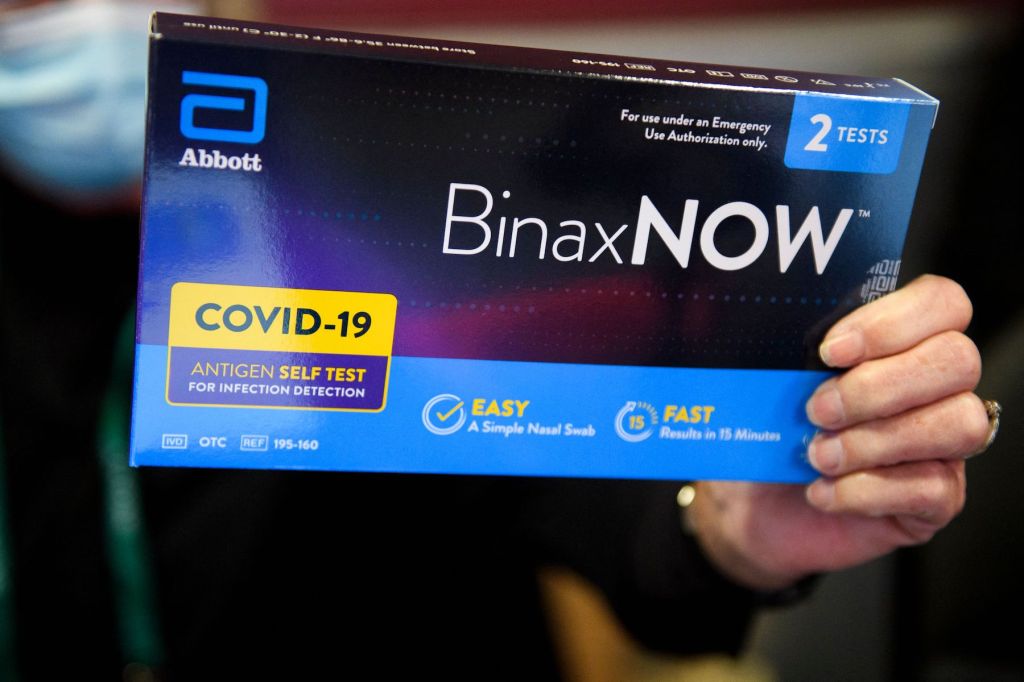With COVID-19 rapid tests sold out everywhere as Omicron surges through the United States, restaurants, liquor stores, candy shops, and ghost kitchens are selling rapid antigen tests through delivery apps like Seamless at hugely marked up prices.


A deli and liquor store in Manhattan is advertising a two-pack of Binax rapid tests on Seamless for $80 (retail is $24) as one of its “new items” alongside corn dogs and garlic bread. Liquid Assets, a liquor store in Brooklyn, offers 2 iHealth at-home rapid tests for $39.99 when they cost $14 from the supplier. It offers increasingly expensive and inflated packages, charging as much as $124.99 for a “Covid Fighter Pack” which features 2 iHealth tests, a digital thermometer, a 32oz of Gatorade, a box of 124 Kleenex, 1 pack of 16 DayQui capsules, 1 pack of 16 NyQuil capsules, a box of Emergen-C Drink Mix, and 1 bag of 24 Ricolas. All together, however, these items should cost at most $90.
Videos by VICE

Pet Foods by Village Farm, which appears to be a Seamless-and-Grubhub-only pet store, sells cat food, dog food, and various types of rapid tests. It is charging $49.99 for 2 iHealth rapid tests that cost $14, charges $59.99 for 2 Access Bio tests while they cost $16.75 at Target, $49.99 for a QuickVue test that costs $23.99 at Walgreens, and $29.99 for a FlowFlex test that costs $9.99. Its most popular option, the BinaxNow rapid test, goes for $49.99 at Pet Foods but $23.99 elsewhere.
Do you have a tip to share about pandemic price gouging? Pleas get in touch with Edward Ongweso Jr via email (edward.ongweso@vice.com) or securely on Signal (202-642-8240).
This isn’t only happening in the United States. In Australia, where tests normally cost $10 to $20, an ongoing test shortage has led to increasingly exorbitant hikes. On Tuesday, the Sydney Morning Herald reported that convenience stores, gas stations, and restaurants were charging as much as $50 per test on UberEats. Earlier reporting has also shown a consistent increase in prices, such as a five-test kit rising from $45 to $90 over a week elsewhere.

UberEats did not respond to Motherboard’s questions about if any mechanisms existed to stop this sort of price gouging.
“As a marketplace, we allow merchants to set their own prices for the items they sell on our platform. We encourage that they use similar pricing as what customers would find if purchasing items in-store and that prices for these tests should be affordable, fair and not exorbitant – especially during a pandemic,” Grubhub said in a statement. “We have a process in place to identify and reach out to merchants when we find potential pricing issues.”

In a statement issued on Tuesday about the ongoing price gouging problem, Australia’s Competition and Consumer Commission—the country’s consumer watchdog—said it was “aware” of the situation, contacting suppliers, and monitoring developments “very closely.” The ACC has previously stated that price gouging is not explicitly illegal, but that it may be able to act when companies engage in gross misconduct or mislead consumers about the rationale behind a price hike.
One immediate concern, beyond the fact that these businesses are taking advantage of the pandemic to eke out an extra profit, is that food delivery platforms are effectively able to do the same. Platforms like UberEats and Seamless, after all, take a cut of each transaction on their service through an assortment of fees and charges, even if the transaction features price hiked goods like the rapid at-home tests offered by these and other businesses.




